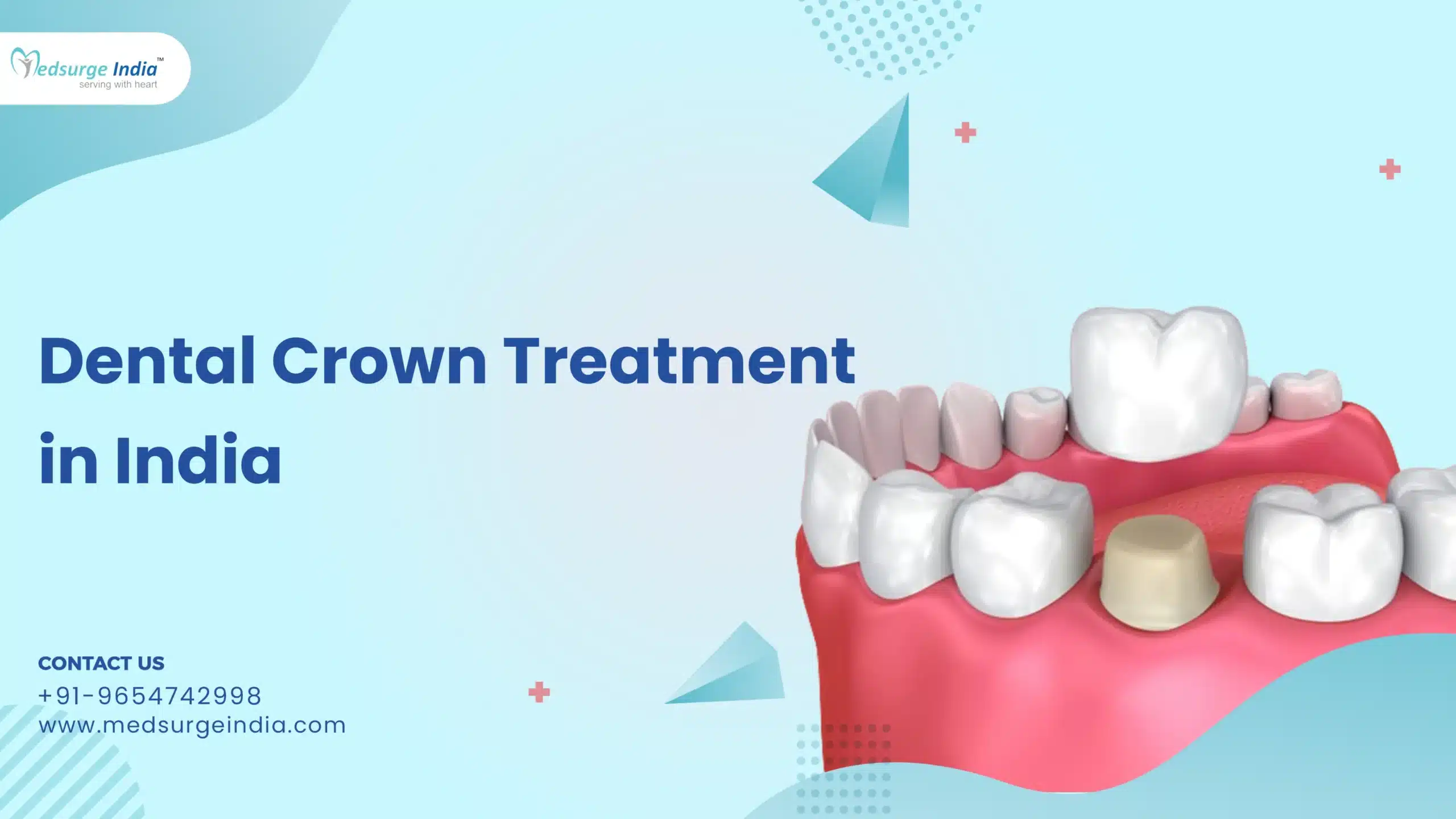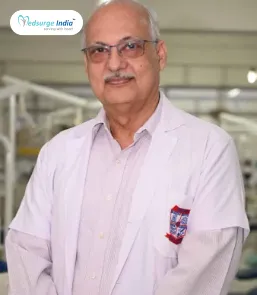Dental Crown Treatment Cost in India
Unlock Exclusive Discount : Your Gateway to Premium Healthcare with Medsurge India Health Value Card.

Unlock Exclusive Discount : Your Gateway to Premium Healthcare with Medsurge India Health Value Card.


A dental crown is a cap shaped like a tooth, designed to restore a tooth that has weakened, decayed, fractured, or worn. Additionally, dentists utilize crowns to encase teeth that have undergone root canal treatment and to cover dental implants. These crowns, which may be constructed from materials such as metal, porcelain, resin, or others, can last between five to fifteen years with appropriate care.
Are you interested in understanding the cost of dental crown treatment in India? Dental procedures can be quite complex, not only in terms of the treatment itself but also regarding the associated expenses. In this, we will examine the various factors that influence dental crown treatment cost in India and guide you to help you make informed decisions regarding your dental care.
Dental Crown Treatment Cost in India starts from 250 USD to 600 USD depending on the type of crown and other factors.
| Cities | Price |
| Delhi | $250 |
| Mumbai | $300 |
| Hyderabad | $300 |
| Gurgaon | $350 |
| Bangalore | $350 |
| Chennai | $350 |
| Kolkata | $300 |
Dental crown treatment cost in India can be influenced by several factors, including:
Dental crowns also referred to as “teeth caps,” are a prosthetic and restorative method for restoring the appearance and functionality of damaged or missing teeth.
A dental crown may be necessary in various circumstances:
A crown can be utilized on primary (baby) teeth for children in order to achieve the following:
There is a wide range of dental crowns available, each with its own distinct characteristics. The selection of the most suitable crown for you is contingent upon your personal preferences and specific oral health requirements.
Porcelain Crowns: Porcelain crowns are highly favored due to their lifelike appearance and ability to seamlessly integrate with adjacent teeth. These crowns are specifically designed to match the color, shape, and size of your natural teeth, rendering them virtually indistinguishable. For individuals desiring aesthetically pleasing outcomes, porcelain crowns represent an excellent choice.
Metal Crowns: Metal crowns are celebrated for their exceptional strength and longevity. Typically composed of gold or silver alloys, these crowns are particularly suitable for molars due to their remarkable resistance to wear. While metal crowns are highly functional, their metallic appearance may not appeal to everyone.
Zirconia Crowns: Zirconia crowns are a relatively recent addition to the array of dental crown options. Constructed from a durable, biocompatible material that closely mimics the natural color of teeth, zirconia crowns are suitable for both anterior and posterior teeth due to their strength and resistance to chipping or fracturing. The cost of zirconia crowns generally falls within the mid-range compared to other types.
Composite Resin Crowns: Composite resin crowns offer an economical solution for dental restoration. Made from a blend of resin and other materials, these crowns provide a natural look. However, composite resin crowns tend to be less durable than other options and may require more frequent replacement.
The procedure’s timeline will vary based on whether your dentist chooses a multi-day or same-day approach.
Through a procedure completed within the same day, you have the option to bypass the temporary crown phase.
A visit to your dentist’s office is required twice for the placement of a traditional crown.
Not every dentist possesses the necessary technology to provide same-day crowns. It is advisable to inquire with your dentist regarding the availability of this option and the estimated cost, particularly if you lack dental insurance.
To ensure the longevity and effectiveness of your dental crowns after investment, it is essential to adopt certain precautions. The following recommendations will assist you in maintaining your dental crowns effectively:
Also Read – Dental Bone Grafting Surgery Cost in India
India is one of the best healthcare service providers and provides the best treatment which is on par with other top countries. These are some reasons why international patients choose India as a top destination as per their budget and treatment.
Gaining a comprehensive understanding of the various types of dental crowns and their associated costs in India is essential for making an informed choice regarding your dental health. You have the option to select from porcelain, metal, zirconia, and composite resin crowns, each tailored to meet different needs and budgetary considerations. Each material presents its own unique advantages and price points.
To ensure the durability and effectiveness of your dental crowns, it is important to follow appropriate maintenance and care practices. It is advisable to consult with a dentist to determine the most suitable dental crown option for your needs, thereby embarking on the journey towards a bright and healthy smile.
Consider scheduling an appointment with Medsurge India today to explore the optimal dental crown solution and take the initial step toward achieving a healthy and aesthetically pleasing smile.
A: Dental crowns are a long-term treatment even if they are not permanent. A crown should last you anywhere from five to twenty years, on average. Maintaining proper oral hygiene is one of the things you can do to help your crown last longer.
A: Porcelain or all-ceramic crowns. Zirconia crowns are more resilient than other ceramic crown varieties, withstanding stresses up to twice as great. They also cause less enamel wear on your opposing teeth because they are mild on them.
A: Drawbacks with Dental Crowns
A: Porcelain crowns are especially popular, and many do break loose and fall out with age. The majority of dentists believe that dental crowns typically last between 10 and 20 years.
A: Since your crown is composed of a unique synthetic material, a cavity cannot form inside the crown itself. On the other hand, the tooth on which your crown is affixed may get a cavity.

Dentist
Senior Consultant
10+ years of experience
KMC Hospital, Hampankatta, Mangaluru
View Doctor
Dentist
Senior Consultant
17+ years of experience
Narayana Multispeciality Hospital, Barasat, Kolkata
View Doctor
Dentist
Senior Consultant
10+ years of experience
NH Rabindranath Tagore International Institute of Cardiac Sciences, Kolkata
View Doctor
Dentist
10+ years of experience
NH Rabindranath Tagore International Institute of Cardiac Sciences, Kolkata
View DoctorDentist
2024+ years of experience
NH Rabindranath Tagore International Institute of Cardiac Sciences, Kolkata
View Doctor
Dentist
26+ years of experience
Rabindranath Tagore Surgical Centre, Hiland Park, Kolkata
View Doctor
Dentist
10+ years of experience
Rabindranath Tagore Surgical Centre, Hiland Park, Kolkata
View Doctor
Dentist
Senior Consultant
12+ years of experience
Rabindranath Tagore Surgical Centre, Hiland Park, Kolkata
View DoctorDentist
Senior Consultant
10+ years of experience
Rabindranath Tagore Surgical Centre, Hiland Park, Kolkata
View DoctorDentist
Senior Consultant
10+ years of experience
NH Rabindranath Tagore International Institute of Cardiac Sciences, Kolkata
View Doctor









By using our site, you agree to our Terms and Conditions, Privacy Policy and Refund Policy. Medsurgeindia does not provide medical advice, diagnosis, or treatment. The information provided on this site is designed to support, not replace, the relationship that exists between a patient/site visitor and his/her existing physician. We also Accept International Payments.

Copyright © 2025 NSM ONLINE SOLUTIONS PRIVATE LIMITED. All rights reserved.